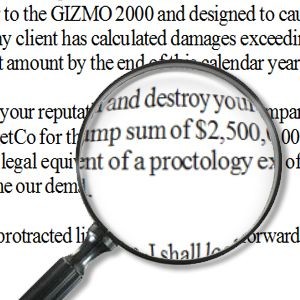Q. Representing a large manufacturer, I sent a demand letter threatening to sue its competitor and promising a nasty discovery process that would be the “legal equivalent of a proctology exam.” Did I go too far?
A. Perhaps.
You are, after all, a Juris Doctor. But that doesn’t entitle you to conduct proctology exams, or the “legal equivalent” thereof.
When “representing a client,” Rule 4.4 of the Rules of Professional Conduct prohibits us from using “means that have no substantial purpose other than to embarrass, delay, or burden a third person.” Indeed, the preamble to our ethics rules require that we “use the law’s procedures only for legitimate purposes and not to harass or intimidate others.”
But some degree of “intimidation” may serve a legitimate purpose. Assuming that your client has a meritorious claim against its rival, you probably won’t get much attention if you try to kill it with kindness. Worded the right way, there’s nothing wrong with sending a strong demand letter outlining the perils of war, the expense of litigation, and its potential impact on the business of your adversary.
For many, protracted litigation, probing depositions and the prospect of trial may be as distasteful as certain medical procedures. Still, threats to inflict pain, to embarrass or to destroy our adversaries call the legitimacy of our efforts into question. In extreme cases, it may even prompt disciplinary charges for engaging “in conduct that is prejudicial to the administration of justice.”
As lawyers, our most powerful weapons are often our most subtle. Those with a command of the facts and the nuance of language need not sacrifice their professionalism to get the other side’s attention. In our profession, hyperbole, ad hominem attacks, and crude language are signs of weakness. Thus, while your earthy letter may not lead to discipline, you can probably do without the medical imagery.
P.S. – Next time, run the letter by me before you mail it off.





